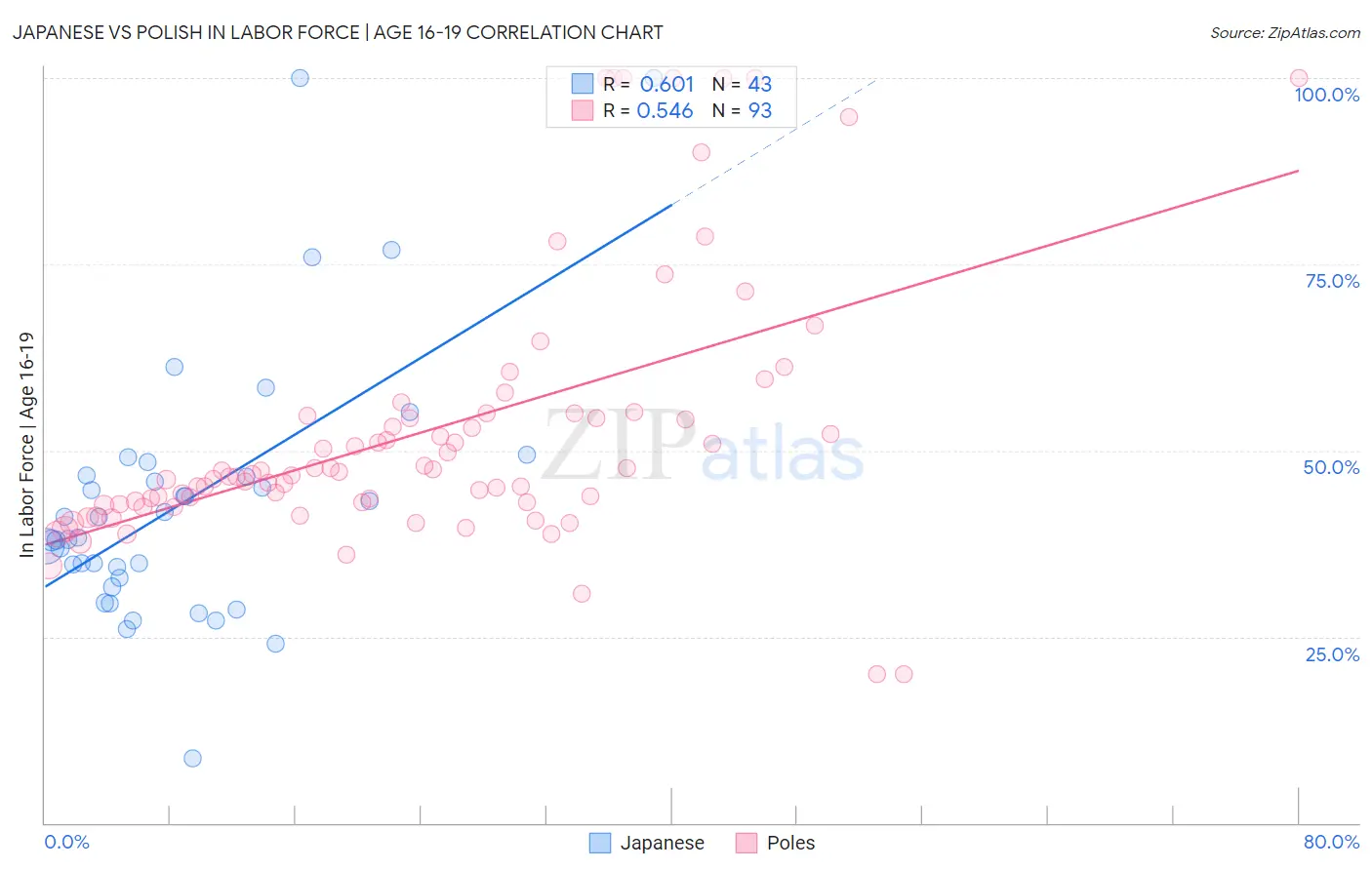Japanese vs Polish In Labor Force | Age 16-19
COMPARE
Japanese
Polish
In Labor Force | Age 16-19
In Labor Force | Age 16-19 Comparison
Japanese
Poles
37.5%
IN LABOR FORCE | AGE 16-19
89.3/ 100
METRIC RATING
144th/ 347
METRIC RANK
42.1%
IN LABOR FORCE | AGE 16-19
100.0/ 100
METRIC RATING
28th/ 347
METRIC RANK
Japanese vs Polish In Labor Force | Age 16-19 Correlation Chart
The statistical analysis conducted on geographies consisting of 249,091,187 people shows a significant positive correlation between the proportion of Japanese and labor force participation rate among population between the ages 16 and 19 in the United States with a correlation coefficient (R) of 0.601 and weighted average of 37.5%. Similarly, the statistical analysis conducted on geographies consisting of 556,989,344 people shows a substantial positive correlation between the proportion of Poles and labor force participation rate among population between the ages 16 and 19 in the United States with a correlation coefficient (R) of 0.546 and weighted average of 42.1%, a difference of 12.2%.

In Labor Force | Age 16-19 Correlation Summary
| Measurement | Japanese | Polish |
| Minimum | 8.6% | 20.0% |
| Maximum | 100.0% | 100.0% |
| Range | 91.4% | 80.0% |
| Mean | 43.1% | 52.6% |
| Median | 38.2% | 46.8% |
| Interquartile 25% (IQ1) | 32.8% | 42.9% |
| Interquartile 75% (IQ3) | 46.7% | 54.9% |
| Interquartile Range (IQR) | 13.8% | 12.0% |
| Standard Deviation (Sample) | 17.9% | 17.8% |
| Standard Deviation (Population) | 17.7% | 17.7% |
Similar Demographics by In Labor Force | Age 16-19
Demographics Similar to Japanese by In Labor Force | Age 16-19
In terms of in labor force | age 16-19, the demographic groups most similar to Japanese are Paiute (37.5%, a difference of 0.0%), Pakistani (37.6%, a difference of 0.020%), Sierra Leonean (37.6%, a difference of 0.050%), Immigrants from Western Europe (37.5%, a difference of 0.050%), and Brazilian (37.5%, a difference of 0.080%).
| Demographics | Rating | Rank | In Labor Force | Age 16-19 |
| Cajuns | 93.2 /100 | #137 | Exceptional 37.8% |
| Comanche | 91.9 /100 | #138 | Exceptional 37.7% |
| Immigrants | Moldova | 91.9 /100 | #139 | Exceptional 37.7% |
| Estonians | 91.7 /100 | #140 | Exceptional 37.7% |
| Syrians | 90.7 /100 | #141 | Exceptional 37.6% |
| Sierra Leoneans | 89.7 /100 | #142 | Excellent 37.6% |
| Pakistanis | 89.5 /100 | #143 | Excellent 37.6% |
| Japanese | 89.3 /100 | #144 | Excellent 37.5% |
| Paiute | 89.3 /100 | #145 | Excellent 37.5% |
| Immigrants | Western Europe | 88.9 /100 | #146 | Excellent 37.5% |
| Brazilians | 88.7 /100 | #147 | Excellent 37.5% |
| Romanians | 87.3 /100 | #148 | Excellent 37.5% |
| Native Hawaiians | 85.0 /100 | #149 | Excellent 37.4% |
| Tsimshian | 84.7 /100 | #150 | Excellent 37.4% |
| Immigrants | Poland | 84.4 /100 | #151 | Excellent 37.3% |
Demographics Similar to Poles by In Labor Force | Age 16-19
In terms of in labor force | age 16-19, the demographic groups most similar to Poles are French (42.1%, a difference of 0.050%), Welsh (42.3%, a difference of 0.29%), Scottish (42.0%, a difference of 0.33%), Irish (42.0%, a difference of 0.40%), and English (42.4%, a difference of 0.57%).
| Demographics | Rating | Rank | In Labor Force | Age 16-19 |
| Ottawa | 100.0 /100 | #21 | Exceptional 43.0% |
| Sudanese | 100.0 /100 | #22 | Exceptional 42.9% |
| Slovaks | 100.0 /100 | #23 | Exceptional 42.6% |
| Bangladeshis | 100.0 /100 | #24 | Exceptional 42.5% |
| German Russians | 100.0 /100 | #25 | Exceptional 42.4% |
| English | 100.0 /100 | #26 | Exceptional 42.4% |
| Welsh | 100.0 /100 | #27 | Exceptional 42.3% |
| Poles | 100.0 /100 | #28 | Exceptional 42.1% |
| French | 100.0 /100 | #29 | Exceptional 42.1% |
| Scottish | 100.0 /100 | #30 | Exceptional 42.0% |
| Irish | 100.0 /100 | #31 | Exceptional 42.0% |
| Czechoslovakians | 100.0 /100 | #32 | Exceptional 41.9% |
| Liberians | 100.0 /100 | #33 | Exceptional 41.8% |
| Immigrants | Bosnia and Herzegovina | 100.0 /100 | #34 | Exceptional 41.8% |
| Yugoslavians | 100.0 /100 | #35 | Exceptional 41.8% |